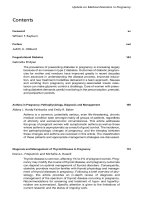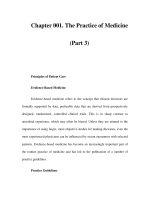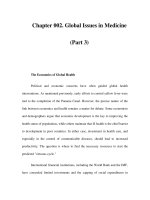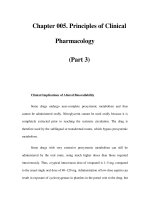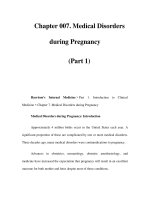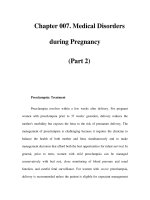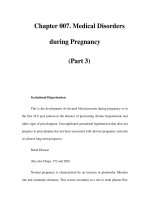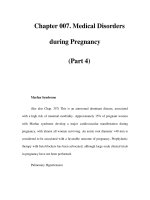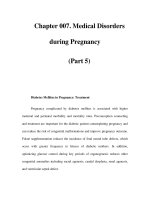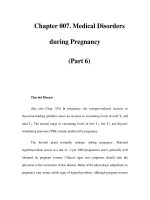Chapter 007. Medical Disorders during Pregnancy (Part 3) pps
Bạn đang xem bản rút gọn của tài liệu. Xem và tải ngay bản đầy đủ của tài liệu tại đây (11.75 KB, 5 trang )
Chapter 007. Medical Disorders
during Pregnancy
(Part 3)
Gestational Hypertension
This is the development of elevated blood pressure during pregnancy or in
the first 24 h post partum in the absence of preexisting chronic hypertension and
other signs of preeclampsia. Uncomplicated gestational hypertension that does not
progress to preeclampsia has not been associated with adverse pregnancy outcome
or adverse long-term prognosis.
Renal Disease
(See also Chaps. 272 and 280)
Normal pregnancy is characterized by an increase in glomerular filtration
rate and creatinine clearance. This occurs secondary to a rise in renal plasma flow
and increased glomerular filtration pressures. Patients with underlying renal
disease and hypertension may expect a worsening of hypertension during
pregnancy. If superimposed preeclampsia develops, the additional endothelial
injury results in a capillary leak syndrome that may make the management of these
patients challenging. In general, patients with underlying renal disease and
hypertension benefit from aggressive management of blood pressure.
Preconception counseling is also essential for these patients so that accurate risk
assessment can occur prior to the establishment of pregnancy and important
medication changes and adjustments can be made. In general, a prepregnancy
serum creatinine level <133 mol/L (<1.5 mg/dL) is associated with a favorable
prognosis. When renal disease worsens during pregnancy, close collaboration
between the nephrologist and the maternal-fetal medicine specialist is essential so
that decisions regarding delivery can be weighed in the context of sequelae of
prematurity for the neonate versus long-term sequelae for the mother with respect
to future renal function.
Cardiac Disease
Valvular Heart Disease
(See also Chap. 230) This is the most common cardiac problem
complicating pregnancy.
Mitral Stenosis
This is the valvular disease most likely to cause death during pregnancy.
The pregnancy-induced increase in blood volume, cardiac output, and tachycardia
can increase the transmitral pressure gradient and cause pulmonary edema in
women with mitral stenosis. Pregnancy associated with long-standing mitral
stenosis may result in pulmonary hypertension. Sudden death has been reported
when hypovolemia has been allowed to occur in this condition. Careful control of
heart rate, especially during labor and delivery, minimizes the impact of
tachycardia and reduced ventricular filling times on cardiac function. Pregnant
women with mitral stenosis are at increased risk for the development of atrial
fibrillation and other tachyarrhythmias. Medical management of severe mitral
stenosis and atrial fibrillation with digoxin and beta blockers is recommended.
Balloon valvulotomy can be carried out during pregnancy.
Mitral Regurgitation and Aortic Regurgitation and Stenosis
These are generally well tolerated during pregnancy. The pregnancy-
induced decrease in systemic vascular resistance reduces the risk of cardiac failure
with these conditions. As a rule, mitral valve prolapse does not present problems
for the pregnant patient, and aortic stenosis, unless very severe, is well tolerated.
In the most severe cases of aortic stenosis, limitation of activity or balloon
valvuloplasty may be indicated.
Congenital Heart Disease
(See also Chap. 229) The presence of a congenital cardiac lesion in the
mother increases the risk of congenital cardiac disease in the newborn. Prenatal
screening of the fetus for congenital cardiac disease with ultrasound is
recommended. Atrial or ventricular septal defect is usually well tolerated during
pregnancy in the absence of pulmonary hypertension, provided that the woman's
prepregnancy cardiac status is favorable. Use of air filters on IV sets during labor
and delivery in patients with intracardiac shunts is generally recommended.
Other Cardiac Disorders
Supraventricular tachycardia (Chap. 226) is a common cardiac
complication of pregnancy. Treatment is the same as in the nonpregnant patient,
and fetal tolerance of medications such as adenosine and calcium channel blockers
is acceptable. When necessary, electrocardioversion may be performed and is
generally well tolerated by mother and fetus.
Peripartum cardiomyopathy (Chap. 231) is an uncommon disorder of
pregnancy associated with myocarditis, and its etiology remains unknown.
Treatment is directed toward symptomatic relief and improvement of cardiac
function. Many patients recover completely; others are left with a progressive
dilated cardiomyopathy. Recurrence in a subsequent pregnancy has been reported,
and women should be counseled to avoid pregnancy after a diagnosis of
peripartum cardiomyopathy.
Specific High-Risk Cardiac Lesions
